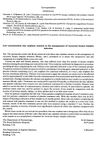 30 citations,
June 2015 in “British Journal of Dermatology”
30 citations,
June 2015 in “British Journal of Dermatology” Acne is common in women, often hormone-related, negatively affects quality of life, and requires various treatments.
 28 citations,
January 2021 in “Parkinsonism & related disorders (Online)/Parkinsonism & related disorders”
28 citations,
January 2021 in “Parkinsonism & related disorders (Online)/Parkinsonism & related disorders” Parkinson's disease is linked to skin disorders and skin cells help in studying the disease.
 22 citations,
October 2020 in “Anais Brasileiros de Dermatologia”
22 citations,
October 2020 in “Anais Brasileiros de Dermatologia” The Brazilian Society of Dermatology agrees that oral isotretinoin is effective for acne and other skin conditions, and it's safe when monitored, but more research is needed on dosing and duration.
 21 citations,
November 2022 in “Frontiers in immunology”
21 citations,
November 2022 in “Frontiers in immunology” Sebaceous glands play a key role in skin health, immunity, and various skin diseases.
 17 citations,
December 2004 in “The Journal of Men's Health & Gender”
17 citations,
December 2004 in “The Journal of Men's Health & Gender” Male pattern baldness involves hormone-related hair thinning, shorter hair, and inflammation.
 16 citations,
July 2002 in “JOGC/Journal of obstetrics and gynaecology Canada”
16 citations,
July 2002 in “JOGC/Journal of obstetrics and gynaecology Canada” Birth control pills can help reduce mild to moderate acne in women.
 11 citations,
December 2019 in “Dermatologic Therapy”
11 citations,
December 2019 in “Dermatologic Therapy” Ketoconazole may help regrow hair and increase follicle size, but more research needed.
 11 citations,
April 2017 in “The European Journal of Contraception & Reproductive Health Care”
11 citations,
April 2017 in “The European Journal of Contraception & Reproductive Health Care” Cyproterone acetate with ethinyl estradiol is effective for treating skin symptoms related to high androgen levels, like in PCOS.
 11 citations,
January 1998 in “Dermatology”
11 citations,
January 1998 in “Dermatology” Spironolactone works well for acne and hirsutism, isotretinoin is very effective for acne and may have antiandrogenic effects, and 5 alpha-reductase inhibitors should be considered antiandrogens.
 8 citations,
September 2018 in “Journal of Cosmetic Dermatology”
8 citations,
September 2018 in “Journal of Cosmetic Dermatology” Lower irisin levels in the blood may indicate more severe acne.
 8 citations,
October 2013 in “The Journal of Spinal Cord Medicine”
8 citations,
October 2013 in “The Journal of Spinal Cord Medicine” Most spinal cord injury patients in Korea experience skin problems, especially fungal infections and eczema, affecting their quality of life.
 8 citations,
January 1996 in “Gynecological Endocrinology”
8 citations,
January 1996 in “Gynecological Endocrinology” Cyproterone acetate is the preferred treatment for women's hyperandrogenism when estrogen/progestogen use is safe.
 6 citations,
July 2017 in “Plastic surgical nursing : official journal of the American Society of Plastic and Reconstructive Surgical Nurses”
6 citations,
July 2017 in “Plastic surgical nursing : official journal of the American Society of Plastic and Reconstructive Surgical Nurses” Microneedling is effective for skin rejuvenation and various skin issues, but more research is needed to confirm its safety and effectiveness.
 6 citations,
August 1996 in “The Journal of Clinical Endocrinology and Metabolism”
6 citations,
August 1996 in “The Journal of Clinical Endocrinology and Metabolism” MK-386 and finasteride together effectively reduce DHT levels, potentially treating acne and male pattern baldness.
 5 citations,
December 1979 in “Clinical and Experimental Dermatology”
5 citations,
December 1979 in “Clinical and Experimental Dermatology” Anti-androgens are effective for female acne but less so for male-pattern hair loss, with side effects similar to birth control pills.
 3 citations,
January 1985 in “British Journal of Dermatology”
3 citations,
January 1985 in “British Journal of Dermatology” Zinc sulphate solution was not effective in reducing the number, duration, or severity of recurrent herpes simplex infections.
 2 citations,
January 2014 in “Springer eBooks”
2 citations,
January 2014 in “Springer eBooks” Polycystic Ovary Syndrome (PCOS) often leads to severe acne, and lifestyle changes and hormonal treatments can help manage it.

research Acne
2 citations,
May 2011 in “Harper's Textbook of Pediatric Dermatology” Acne is a common skin condition linked to diet, hormones, and genetics, and early treatment can prevent scarring.
 1 citations,
January 2014 in “Springer eBooks”
1 citations,
January 2014 in “Springer eBooks” Adult acne is more common in women, often linked to hormones, and can be harder to treat.
 1 citations,
January 2009 in “CRC Press eBooks”
1 citations,
January 2009 in “CRC Press eBooks” Finasteride increases hair count and improves hair growth with low risk of side effects.
 January 2024 in “International Journal of Dermatology Venereology and Leprosy Sciences”
January 2024 in “International Journal of Dermatology Venereology and Leprosy Sciences” Patients with acne vulgaris have lower serum irisin levels.
 January 2024 in “Acta Facultatis Medicae Naissensis”
January 2024 in “Acta Facultatis Medicae Naissensis” Cosmeceuticals are important for managing skin issues during the COVID-19 pandemic.
 January 2023 in “Postępy Dermatologii i Alergologii”
January 2023 in “Postępy Dermatologii i Alergologii” Azelaic acid treats acne, rosacea, and hyperpigmentation with minimal side effects.
 June 2008 in “British Journal of Dermatology”
June 2008 in “British Journal of Dermatology” Herpes gestationis is linked to certain antigens, atopic eczema affects T cell populations and may be eased by breastfeeding, higher doses of anti-androgen treatment can improve androgenic alopecia, topical minoxidil increases hair thickness, long-term methotrexate therapy can cause liver fibrosis in psoriasis patients, and Lichen Sclerosus et Atrophicus patients aren't at higher risk for autoimmune disorders.
 1 citations,
January 1989 in “Handbook of experimental pharmacology”
1 citations,
January 1989 in “Handbook of experimental pharmacology” Anti-androgens can help reduce the effects of male hormones on the skin.
200 citations,
August 2009 in “Experimental dermatology” Eating high-glycemic foods and drinking milk may worsen acne by increasing insulin and IGF-1 levels.
5 citations,
August 1999 in “Disease-a-month” Hormonal imbalances can cause acne, and treatments may include hormone-blocking medications.
 April 2024 in “Animal models and experimental medicine”
April 2024 in “Animal models and experimental medicine” PRP treatment helps hair growth and rebalances scalp bacteria in androgenetic alopecia patients.
16 citations,
September 2019 in “Journal of biological chemistry/The Journal of biological chemistry” Mice without certain skin enzymes have faster hair growth and bigger eye glands.
32 citations,
December 2019 in “The Journal of clinical investigation/The journal of clinical investigation” A protein called IL-36γ causes skin side effects from certain cancer treatments when combined with a common skin bacteria.


























